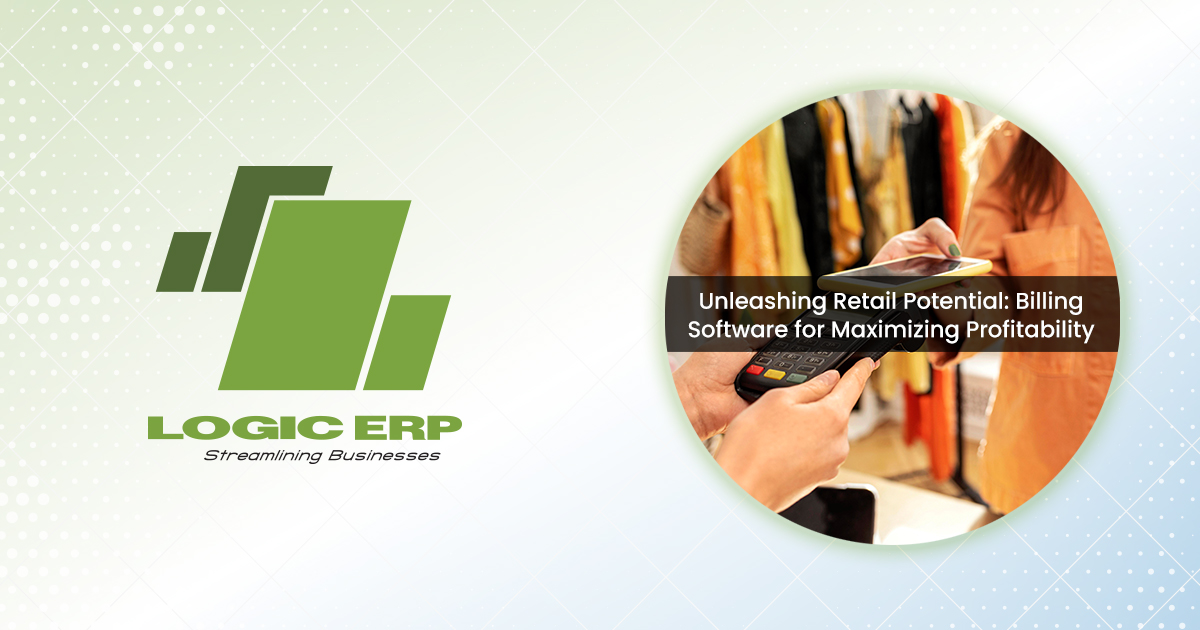

In today’s competitive retail landscape, staying ahead requires more than just efficient transactions. While retail billing software is indispensable for streamlining operations, its capabilities often fall short in maximizing profitability and fostering sustainable growth. To truly thrive, retailers must embrace holistic solutions like cloud-based billing software and integrated ERP systems tailored to their unique needs. In this article, we delve into how transcending traditional billing software can unlock new avenues for success in the retail sector.
The Limitations of Conventional Billing Software
Billing software serves as the backbone of retail operations, facilitating transactions, managing inventory, and generating invoices. However, its functionality is typically confined to these basic tasks, offering limited insights into broader business dynamics. Conventional billing systems lack the scalability and flexibility needed to adapt to evolving market trends and consumer preferences. As a result, retailers may find themselves trapped in a cycle of reactive decision-making, unable to proactively drive growth.
Embracing Cloud-Based Billing Software
Cloud-based billing software represents a significant leap forward for retailers seeking to transcend the constraints of traditional systems. By harnessing the power of the cloud, businesses gain access to real-time data, enhanced security, and unparalleled scalability. Unlike on-premises solutions, cloud-based platforms enable seamless integration with other business tools and applications, fostering collaboration and efficiency across departments.
One of the key advantages of cloud-based billing software is its ability to provide comprehensive insights into customer behavior and purchasing patterns. By analyzing transaction data and customer demographics, retailers can identify trends, anticipate demand, and tailor marketing strategies accordingly. Moreover, cloud-based solutions offer greater flexibility in terms of pricing models, allowing retailers to scale their operations without incurring substantial upfront costs.
The Role of Retail ERP Solutions
While billing software addresses immediate transactional needs, retailers must look beyond point solutions to achieve long-term success. Enterprise Resource Planning (ERP) systems offer a holistic approach to business management, integrating core processes such as inventory management, supply chain logistics, and financial accounting. By consolidating disparate functions into a unified platform, ERP solutions enable retailers to streamline operations, reduce inefficiencies, and drive profitability.
A retail ERP solution goes beyond the capabilities of standalone billing software by providing a comprehensive view of the entire business ecosystem. From procurement and warehousing to sales and customer service, every aspect of the retail value chain is interconnected within the ERP framework. This holistic approach empowers retailers to make data-driven decisions, optimize resource allocation, and adapt to changing market dynamics in real time.
Unlocking Growth Opportunities
By combining cloud-based billing software with an integrated ERP system, retailers can unlock a wealth of growth opportunities. These synergistic solutions enable businesses to:
-
Enhance Operational Efficiency: Streamline processes, minimize errors, and reduce administrative overhead through automation and integration.
-
Improve Customer Experience: Gain deeper insights into customer preferences, personalize interactions, and foster long-term loyalty through targeted marketing campaigns.
-
Optimize Inventory Management: Maintain optimal stock levels, prevent stockouts, and minimize carrying costs by leveraging real-time inventory data and demand forecasting.
-
Expand Market Reach: Seamlessly integrate online and offline channels, expand into new markets, and diversify revenue streams to fuel sustainable growth.
-
Drive Financial Performance: Monitor key performance indicators, track revenue streams, and optimize pricing strategies to maximize profitability and shareholder value.
Case Study: The Power of Integration
Consider a hypothetical retail chain facing challenges with inventory management and customer engagement. By implementing a cloud-based billing software and integrating it with a retail ERP solution, the company experiences a transformative shift in its operations:
-
Streamlined Operations: Automated invoicing and inventory updates reduce manual errors and free up staff to focus on strategic initiatives.
-
Personalized Marketing: Targeted promotions based on customer purchase history and preferences drive higher conversion rates and repeat business.
-
Efficient Supply Chain: Real-time visibility into inventory levels and supplier performance enables proactive replenishment and cost optimization.
-
Scalable Growth: With a solid foundation in place, the retailer expands its footprint, opens new storefronts, and captures market share in untapped regions.
Conclusion
In the fast-paced world of retail, success hinges on the ability to adapt, innovate, and stay ahead of the competition. While billing software is essential for transactional efficiency, retailers must embrace ERP system to unlock their full potential. By leveraging real-time data, automation, and integration, businesses can streamline operations, enhance customer experiences, and drive sustainable growth in an increasingly complex marketplace. As the retail landscape continues to evolve, those who dare to go beyond the status quo will emerge as the true champions of profitability and prosperity.

